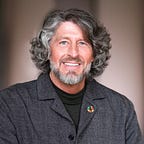Jocelyn C. Zuckerman on Inside Ideas
How palm oil poisons the planet
Jocelyn C. Zuckerman is my guest today on Inside Ideas. The award-winning, Brooklyn-based writer joins me on the show to talk about her first book, Planet Palm: How Palm Ended Up in Everything — and Endangered the World.
The former executive editor of Modern Farmer, and deputy editor of Gourmet, first had the idea back in 2014 that she wanted to write a story about land grabs, and that was the beginning of what would turn out to be a story about palm oil.
“It was 2014 and I had the idea that I wanted to write a story about land grabs, so this was in the aftermath of the food and fuel crises of 2008 when there were the protests around the world when food and fuel prices were really high, which led in part to the Arab Spring and other uprisings,” Zuckerman explained. “Another thing that came up after that was that agrobusiness and sovereign wealth funds were looking around the planet for large swathes of fertile land they could buy or rent, either as an investment or to grow food to send back to their population. This tended to happen in places like Ethiopia and Madagascar where maybe governance is not great and people on the ground can be pushed off the land without many people knowing about it.”
She continued: “So this was what I wanted to write about. I could have reported from any number of places, sadly, but I settled on Liberia, in part because of the relationship the country had with the states — it was founded by freed American slaves. I had also long admired Ellen Johnson Sirleaf — the president of the country. I would be less admiring of her after the reporting but at the time I had only read positive things about her. So I went to Liberia to report the story on land grabs and I got down there and what I saw, as I describe in the book, was just miles and miles of rainforest that had been cleared where they were about to plant the oil palm plant, and then other places there were young, early plantations of this oil palm plant. They were young — maybe three feet high. We drove for hours with a photographer and local researcher. They had just cleared land, pushed people out of their villages and there were miles and miles of these plantations. I had worked at Gourmet magazine for 12 years and written for various other places about food, agriculture, nutrition and environmental issues but I knew nothing about palm oil and yet here were masses of land growing this crop. So that planted the seed for questions around it and here we are seven years later.”
It is a journey that taught Zuckerman about an obsession that was ripping down rainforests, accelerating biodiversity loss, and killing tens of thousands of orangutans.
“The oil palm is indigenous to west and central Africa so it grows best at 10 degrees to the north and south of the equator, which is the same latitude Indonesia and Malaysia are on,” she said. “The problem is that it’s that exact swathe of the planet that is home to our tropical rainforests. Which, as we know, are massively important for sequestering carbon, and are home to our most important biodiversity. Much of it also sits on top of peatlands, organic matter that has accumulated over millennia, and the companies burn that, chop down the forests and then burn it, so it’s carbon flowing into the atmosphere for years and years. Back at the turn of the century no-one was thinking about carbon emissions or biodiversity loss — it wasn’t on our radars so we’re learning as we go and hopefully it’s not too late.”
She added: “The industry has got away with all this shit for so long because nobody knows anything about it and I think people should say ‘hello — we know what’s going on here and we don’t want to stand for it any more.”
On the way ahead, Zuckerman, who has been the recipient of a James Beard Award for feature writing, said: “The problem is monoculture plantations but that’s what the corporations want because that is where they can make all the money, by having one massive thing that they can farm without having to use that much labour. The problem is the industrialised stuff, if you are producing it in an artisanal way, I think it can be done right but we don’t need as much palm oil in our diet, in our world — we need to rethink what those tropical lands can be better used for. All of our concepts of capitalism, borders, countries — we need to throw everything up in the air and figure out how we move ahead.”
Palm oil has been one of the most explosive stories of recent years and I am delighted to have the person that has literally written the book on it join me on Inside Ideas to explain how it all went wrong and what the next chapter might hold.
Article from INNOVATORS MAGAZINE.
Get a deep dive on inside ideas from global thought leaders, sign up for our ‘Innovate Now’ newsletter to get episodes straight to your inbox.
Watch and subscribe to Inside Ideas on YouTube, listen wherever you get your podcast, and follow the show on Instagram, Facebook, LinkedIn, Innovators magazine, and Apple News.
